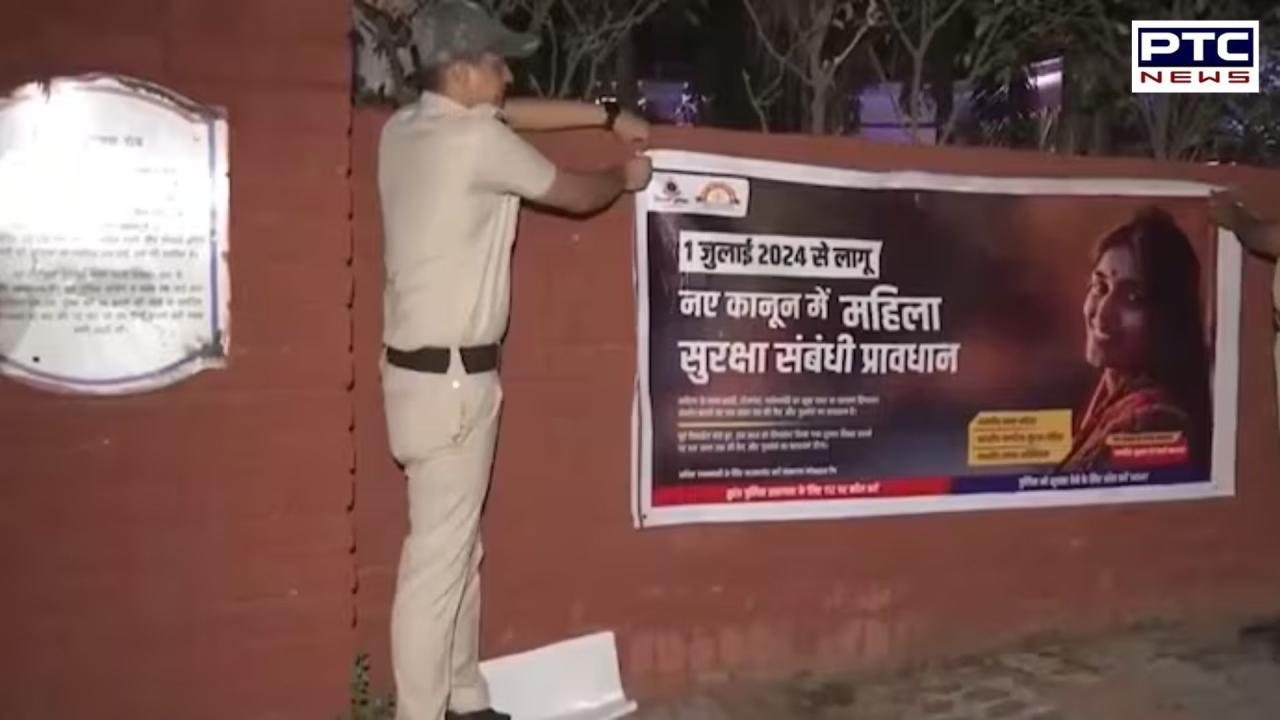New criminal laws enacted, awareness posters displayed across Delhi
In an effort to update India's criminal justice system and put a greater emphasis on crimes against women, children, and national security, the Delhi Police is putting three new criminal laws into effect in place of legislation from the colonial era.

PTC News Desk: Posters informing people about the three new criminal laws that will take effect nationwide on Monday have been placed up at various locations, including police stations, throughout the nation's capital as the Delhi Police gets ready to put them into force.
There were posters at the police stations at Connaught Place, Tughlak Road, Tughlaqabad, and many other places that provided information about the new laws.
Information about laws and the changes they will bring is included in posters. The new criminal laws would repeal rules from the colonial era and drastically alter India's criminal justice system.
Indian Penal Code, Code of Criminal Procedure, and Indian Evidence Act from the British era will be replaced with Bharatiya Nyaya Sanhita, Bharatiya Nagarik Suraksha Sanhita, and Bharatiya Sakshya Adhiniyam, respectively.
BHARATIYA NYAYA SANHITA
There are 358 sections in the Bharatiya Nyaya Sanhita, compared to 511 in the IPC. Twenty additional offenses have been added to the Sanhita, and the penalty for thirty-three offenses has been enhanced to jail.
For 83 crimes, there is now a greater fine, and for 23 crimes, there is now an obligatory minimum punishment. Six crimes now carry a community service punishment, while the Act has 19 sections that have been eliminated or deleted.
In order to address sexual crimes, Bharatiya Nyaya Sanhita has added a new chapter titled "Crimes against Women and Children." Sanhita is also suggesting revisions to the laws pertaining to the rape of women who are younger than 18-years-old.
The Protection of Children from Sexual Offenses Act (Pocso) is compatible with the provisions pertaining to the gang rape of a minor woman. For girls under the age of eighteen, there is also a provision for life in jail or the death sentence.
In the Sanhita, gang rape of a woman under the age of eighteen is a new felony category that carries a maximum sentence of twenty years or life in prison.
The Sanhita imposes specific sanctions on anyone who falsely engage in sexual activity or make marriage-related promises without really intending to tie the knot.
Also Read: Congress blames INDIA Bloc ally AAP for Lok Sabha loss in Delhi: 'Due to excise scam...'
The Bharatiya Nyaya Sanhita is the first document to describe terrorism and to make it a criminal offense.
The Bharatiya Nyaya Sanhita, Section "whoever, with intent to endanger or is likely to endanger the unity, integrity, sovereignty, security or economic security or sovereignty of India or to cause or spread terror amongst the public or any section of the public in India or in any foreign country, commits any act using bombs, dynamite, explosive substances, poisonous gases, nuclear with intent to cause death to any person or persons, damage to property, or manufacture or smuggling of currency or so, he commits terrorist acts" .
Terrorist activities are punishable by life in prison without the possibility of release or the death sentence in the Sanhita. The Sanhita has also added a number of terrorist offenses, and it makes clear that it is illegal to demolish either private or public property.
This provision also covers acts that result in "widespread loss by reason of damage or destruction of critical infrastructure."
First Information Reports (FIRs) can now be filed anywhere, regardless of the location where the crime occurred, as the practice of filing zero FIRs has been institutionalised.
These statutes guarantee victims' access to information, including the right to a free copy of the preliminary investigation report. Additionally, a clause states that the victim must be notified of the investigation's status within ninety days.
Also Read: Classmates to become Indian Army and Navy Chiefs for first time in military history
BHARATIYA NAGRIK SURAKSHA SANHITA
There are 531 sections in the Bharatiya Nagrik Suraksha Sanhita, compared to 484 in the CrPC.
The Sanhita has undergone changes to 177 provisions in total. Additionally, it has gained nine new sections and 39 new sub-parts.
44 new provisions and clarifications have been added to the Act. Thirty-five locations now have audio-video availability, and thirty-five portions now have timelines. The Sanhita has had fourteen sections eliminated or repealed in all.
Also Read: Tinder Date Gone Wrong: Man scammed into paying Rs 1.2 lakh bill at Delhi cafe
BHARATIYA SAKSHYA ADHINIYAM
There have been changes to 24 provisions in Bharatiya Sakshya Adhiniyam, which now has 170 provisions instead of the original 167.
In the Adhiniyam, six provisions have been removed or abolished, while two new provisions and six sub-provisions have been introduced.
With the recent criminal justice reform in India, crimes against women, children, and the country are now given priority. This represents a dramatic change in priorities.
